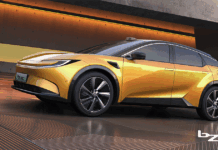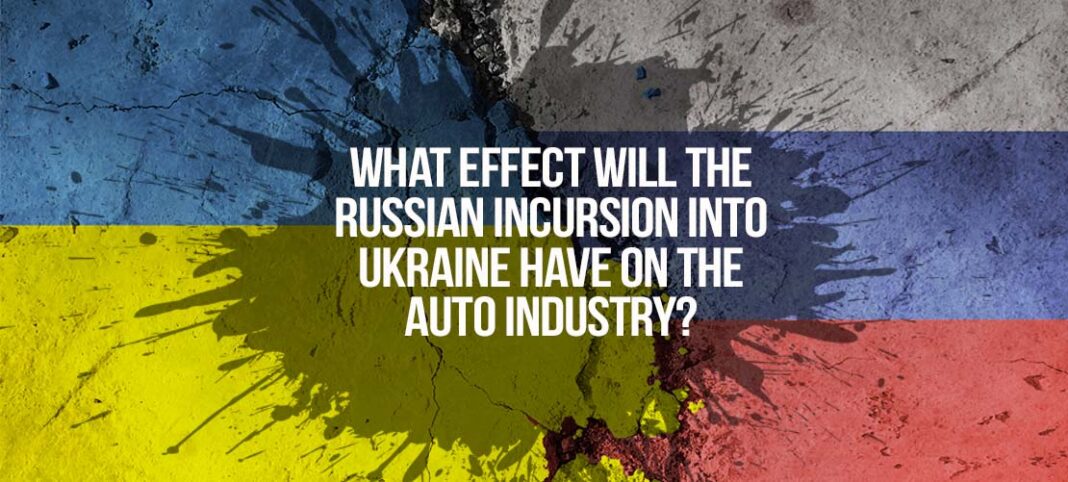Another Body Blow To The Auto Industry.
The events of the past week has thrown global markets into near chaos, as automakers gauge the impact of war — and economic sanctions against aggressor Russia. Their focus is on supply lines and production, while protecting workforces who could now be in harm’s way. European automakers will likely take the largest hit, as supply lines from Ukraine and Russia are interrupted. Hyundai and Kia’s significant manufacturing interests in Russia now present an issue for the Korean group, as well.
Multiple global automakers have reportedly ceased shipments of dealer orders to Russian partners, effective February 24, the date of the Russian invasion, according to letters apparently sent from the automakers and viewed by the Russian-language business paper Vedomosti. Russian dealers for Audi and Chevrolet reportedly received notices, and Vedomosti claims VW and Skoda are prepping notices of their own. Porsche and Land Rover’s Tata Group had also halted shipments starting the date of the Russian invasion. If this is all true, and it likely is, it’s unclear exactly what conditions forced the shut down—but it probably isn’t going to be easy getting your car through Russian customs right now.
The report says Audi will inform its partners on its plans to resume shipments down the road. Any inventory from automakers that’s already passed through Russian customs will still be delivered. The quick move to halt shipments to Russia on the part of most automakers is likely precautionary and temporary, and more to do with establishing new logistics options adapted to an environment now at war, and in the environment of new global sanctions against Russia. Companies obviously face public pressure to not appear too cozy with a current aggressor, so the shipment freeze is likely an indefinite delay until everybody calms down.
Inevitably, the U.S. government and its allies’ sanctions against Russia will further exacerbate the ongoing semiconductor shortage. While no semiconductors or raw materials used to make them will be flowing into Russia, much of the raw materials come from Ukraine, which probably won’t be exporting them for a while.
J.D. Power and LMC Automotive analysts have downgraded projected global light vehicle production this year to 85.8 million units for 2022, a cut of 400,000 vehicles this year, Reuters says. However, the overall global volume of light vehicle sales is still expected to rise by 5 percent.
Korea’s Issues
The outbreak of war and the onslaught of economic and financial sanctions against Russia now put all of Hyundai and Kia global business in jeopardy and will severely damage the national Korean economy, as well. The Korea Times says “Korean conglomerates” sold $2.5 billion worth of cars to Russia in 2021, plus an additional $1.45 billion worth of car parts and components.
Cars and their parts previously accounted for 44 percent of Korea’s annual export volume to Russia, which will likely be severely hindered by American and European sanctions looking to cut trade and handicap Russia’s economy.
Hankook Tires, another Korean company, evacuated its sales office in the country. An official from Hyundai offered that the company has “been closely monitoring the situation as the Russian-Ukraine crisis is expected to bring about an economic slump and weak ruble,” in a statement to the Korea Herald.
Bad news for battery production, high-tech products
The war in Ukraine could also severely impact global EV battery cell production, as the nation is the world’s third-largest producer of nickel and aluminum, two highly valuable resources necessary in battery and EV components. Additionally, Ukraine produces almost 70 percent of the world’s neon gas needed for components like chips, which are already suffering a shortage that has driven the average new vehicle transaction price in the U.S. to unbelievable new heights. It will likely only grow higher this year.
Ukraine is also a critical global supplier of rare gases used in all sorts of high-tech equipment and components, and the war will severely hinder those supplies and likely cause prices to rise. This, too, will have a specific impact on the Korean economy, as the nation imports 30.7 percent of its krypton, 23 percent of its neon, and 17.8 percent of its xenon rare gases for component production from Ukraine, according to the Korea Herald. South Korean-based automaker SsangYong also imports raw materials like aluminum from the region.










![– [ ] ☎️CALL NOW!! ????????
– [ ] (786)650-9456 #ydiaztowing
– [ ] ????Best Towing Service in Miami????
– [ ] .
– [ ] .
– [ ] .
…](https://www.miamicars.com/wp-content/uploads/2024/04/439880935_17874044664082011_820307467258220909_n-100x70.jpg)



![– [ ] ☎️CALL NOW!! ????????
– [ ] (786)650-9456 #ydiaztowing
– [ ] ????Best Towing Service in Miami????
– [ ] .
– [ ] .
– [ ] .
…](https://www.miamicars.com/wp-content/uploads/2024/04/439880935_17874044664082011_820307467258220909_n-324x160.jpg)

